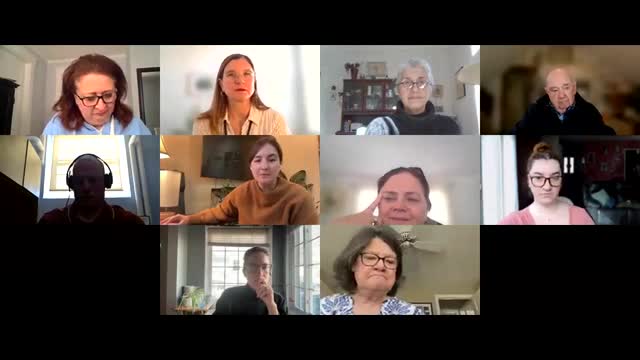Regional public‑health group prioritizes recordkeeping, training and tobacco‑free proposal as state data rollout looms
Get AI-powered insights, summaries, and transcripts
Subscribe
Summary
Representatives from Dover, Medfield, Needham and Sherborn reviewed a draft strategic plan that emphasizes electronic records, cross‑municipal onboarding and environmental health priorities; members flagged uncertainty about a state data system rollout and federal funding.
Megan Russell, a consultant with BME, told members of the shared‑services public‑health group that the meeting marked “our meeting 3, which is our sort of official halfway point,” as the team reviewed a draft strategic plan and a crosswalk of self‑assessment results.
The group identified three near‑term priorities: implementing an electronic record‑keeping system and improving data collection; expanding cross‑municipality training and onboarding (a “buddy” system) to share expertise; and addressing environmental health gaps including hoarding response, septic/sewer capacity and oversight of solid‑waste/transfer stations. Members also discussed advancing a tobacco‑free generation policy in some towns.
Why it matters: the choices the group makes about recordkeeping software and shared services will affect inspection workflows, grant writing, reporting and staffing across multiple towns. Several members warned the state’s planned data system and recent federal funding actions could change costs and timelines.
Bridal Romano and Megan Russell of BME presented a crosswalk tool that compiles each municipality’s self‑assessment answers and flags items many towns reported as gaps. The consultants said the tool distinguishes whether a “no” answer reflects a training need, lack of awareness, staffing shortage or insufficient funding, and can point to where quick knowledge transfer between towns could close gaps without external contracts.
Carrie (staff member for the shared services arrangement) urged caution about labeling all gaps as training needs. “The number of things that are training, actual training is is smaller than that 19,” she said, arguing that some gaps require simple job aids, coaching or links to existing resources rather than formal courses.
Members agreed the group should focus recordkeeping efforts on future data collection rather than attempting a large, immediate backfill of old records. Daryl Beardsley and others argued it would be more productive to implement a searchable electronic system moving forward than to attempt to make all past paper files fully searchable.
A key uncertainty is the state’s new data solution, repeatedly discussed in the meeting as “Metrc” (the name used by presenters). Members said the state has telegraphed a phased rollout and indicated that, once live, the state tool would be the funded option for inspections and reporting — which could affect whether towns continue paying for external products such as Food Code Pro. Meeting participants cited a phased release schedule presented in an FAQ: a first phased release for food, housing and pool inspections and complaints (noted as a November–February phased rollout), an April release for grants/work plans/performance standards, and a summer/fall release for applications, permits and analytics. Participants also noted the vendor named by the state for this development was Salesforce.
Carrie and others warned that funding is uncertain. Carrie said some dollars they had hoped to use for projects are currently on hold because of “a stop work order that was issued by the federal government yesterday,” and that those developments must be considered when setting priorities and budgets.
On staffing and shared services, members supported a buddy/onboarding system for new staff across municipalities. Ed Cosgrove of Needham described how shared hands‑on training could let Needham staff learn septic and well inspection techniques from Dover and Sherborn, while those towns could learn from Needham’s higher volume of food‑service inspections.
Environmental health topics drew detailed discussion. Needham and other towns reported repeated hoarding cases that typically surface only after a fire or police emergency. “It usually takes either a fire or a police emergency… and they find that they can barely get in the front door,” Ed Cosgrove said, describing why pro‑active identification and a standardized municipal response matter. The group identified possible actions including targeted training, standard operating procedures (SOPs) and consulting existing task forces and university resources (Boston University’s hoarding task force was named as a resource).
On septic and sewer capacity, members recommended more cross‑municipal training so inspectors with greater volume can mentor staff from smaller towns. On solid‑waste facilities and transfer stations, participants said local responsibilities are unclear and vary by town; one member noted Chapter 111 (as cited in the meeting) assigns related duties to boards of health, but towns reported a range of practices and that oversight often involves state agencies such as MassDEP.
Tobacco policy discussion focused on a proposed tobacco‑free generation approach. Needham staff offered to share their experience, noting Needham previously led on tobacco‑21 implementation. Several towns said they would consider learning sessions or town‑level conversations before pursuing formal local policy.
Next steps: BME will revise the priorities/goals/objectives table, add activities discussed in the meeting, share the crosswalk spreadsheet with members, and propose a draft timeline and metrics for feedback. Consultants said they are scheduling individual interviews to gather follow‑up input. The group agreed to reconvene; there was no formal adoption of the strategic plan at this meeting.
Votes at a glance: Jason Belmonte moved to adjourn the meeting; Kathy Thompson seconded. A roll‑call vote recorded yes votes from Dover (Jason Belmonte), Medfield (Kathy Thompson), Needham (Ed Cosgrove) and Sherburne (Daryl Beardsley); the motion carried and the meeting adjourned.
The consultants and staff will circulate updated materials and a timeline for FY‑26/FY‑27 considerations, with particular attention to the state data rollout and the towns’ funding constraints.
